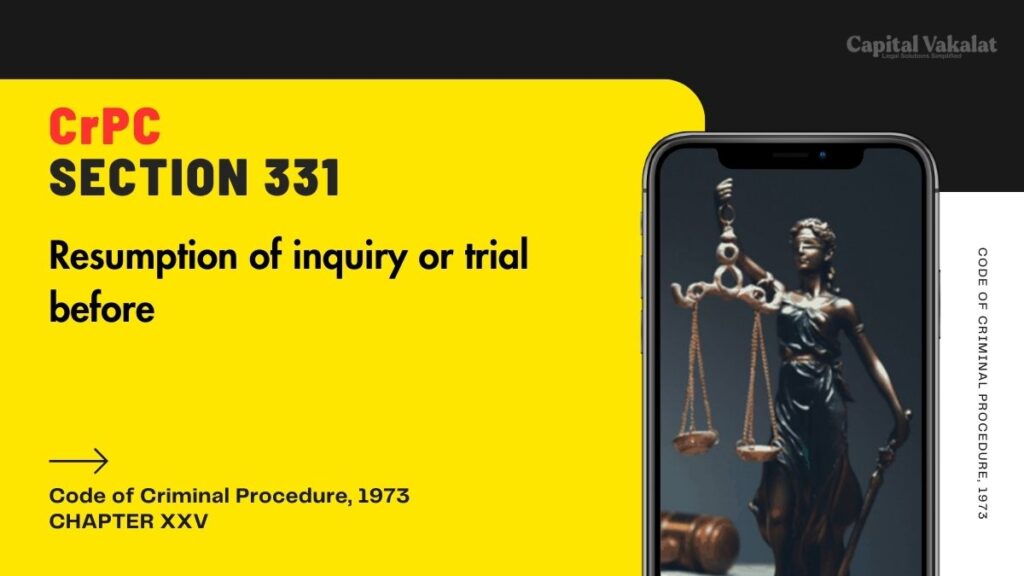The legal landscape in India is intricate, with various laws and sections that ensure justice is served while maintaining order. One such important provision is Section 331 of the Criminal Procedure Code (CrPC).

This section addresses the resumption of an inquiry or trial, offering a framework for continuing legal proceedings in certain circumstances.
Bare Act. Section 331 Cr.P.C.
Resumption of inquiry or trial.
(1) Whenever an inquiry or a trial is postponed under section 328 or section 329, the Magistrate or Court, as the case may be, may at any time after the person concerned has ceased to be of unsound mind, resume the inquiry or trial and require the accused to appear or be brought before such Magistrate or Court.
(2) When the accused has been released under section 330, and the sureties for his appearance produce him to the officer whom the Magistrate or Court appoints in this behalf, the certificate of such officer that the accused is capable of making his defence shall be receivable in evidence.
What is Section 331 CrPC?
Section 331 of the CrPC deals with the resumption of an inquiry or trial if it has been postponed due to the accused being of unsound mind and incapable of making a defense. It ensures that legal proceedings are not left in abeyance indefinitely, providing a systematic approach to handle such cases.
Historical Background of Section 331 CrPC
Understanding the historical context of Section 331 CrPC requires delving into the evolution of criminal law in India. The CrPC, enacted in 1973, replaced the earlier Code of Criminal Procedure, 1898. Section 331 was incorporated to ensure fair treatment of accused persons with mental health issues, reflecting a progressive approach towards mental health in the criminal justice system.
Legal Provisions Under Section 331 CrPC
Section 331 CrPC is specifically tailored to address situations where an accused is found to be mentally unfit. The key provisions include:
- Medical Examination: If an accused is suspected to be of unsound mind, the court can order a medical examination.
- Postponement of Proceedings: If confirmed, the proceedings can be postponed until the accused is fit to stand trial.
- Resumption of Proceedings: Once the accused is declared fit, the inquiry or trial can be resumed from the point it was halted.
Procedure for Resumption of Inquiry or Trial
The procedure under Section 331 CrPC is meticulous, ensuring the rights of the accused while maintaining judicial efficiency.
- Medical Assessment: Initial assessment by a qualified medical practitioner.
- Court’s Order: Based on medical reports, the court decides on postponing the trial.
- Periodic Reviews: Regular medical evaluations to determine the mental state of the accused.
- Declaration of Fitness: Resumption of trial once the accused is declared fit by medical authorities.
Importance of Mental Health Evaluation
Mental health plays a crucial role in the legal proceedings under Section 331 CrPC. Ensuring that the accused can comprehend the trial and contribute to their defense is paramount. This section underscores the judiciary’s responsibility to balance legal procedures with humane treatment.
Challenges in Implementing Section 331 CrPC
Implementing Section 331 CrPC poses several challenges:
- Resource Constraints: Limited access to mental health professionals can delay proceedings.
- Stigma and Awareness: Societal stigma around mental health can influence judicial and medical assessments.
- Consistency in Medical Evaluations: Ensuring uniform standards across different regions is difficult.
Case Studies Highlighting Section 331 CrPC
Examining case studies provides practical insights into the application of Section 331 CrPC. For instance, in the case of XYZ v. State, the trial was postponed multiple times due to the accused’s fluctuating mental health, highlighting the complexities involved.
Judicial Interpretations of Section 331 CrPC
Judicial interpretations of Section 331 CrPC have evolved, reflecting a nuanced understanding of mental health in legal contexts. Landmark judgments have clarified the scope and limitations of this section, ensuring it serves justice while protecting the rights of the mentally ill.
Role of Medical Practitioners Under Section 331 CrPC
Medical practitioners play a pivotal role under Section 331 CrPC. Their assessments directly influence the court’s decision to postpone or resume trials, placing significant responsibility on their shoulders.
Comparative Analysis with Other Jurisdictions
Comparing Section 331 CrPC with similar provisions in other jurisdictions reveals different approaches to handling mentally unfit accused persons. Countries like the UK and USA have robust systems in place, offering a broader perspective on managing such cases.
Reforms and Recommendations for Section 331 CrPC
To enhance the effectiveness of Section 331 CrPC, several reforms can be considered:
- Training for Legal Professionals: Specialized training on mental health issues.
- Improved Medical Infrastructure: Better access to mental health facilities.
- Awareness Programs: Reducing stigma and increasing awareness about mental health in the legal system.
Conclusion
Section 331 CrPC is a vital provision in the Indian legal system, ensuring that justice is not compromised due to the mental health of the accused. While challenges remain, ongoing reforms and a deeper understanding of mental health can enhance its implementation, ensuring a just and humane legal process.